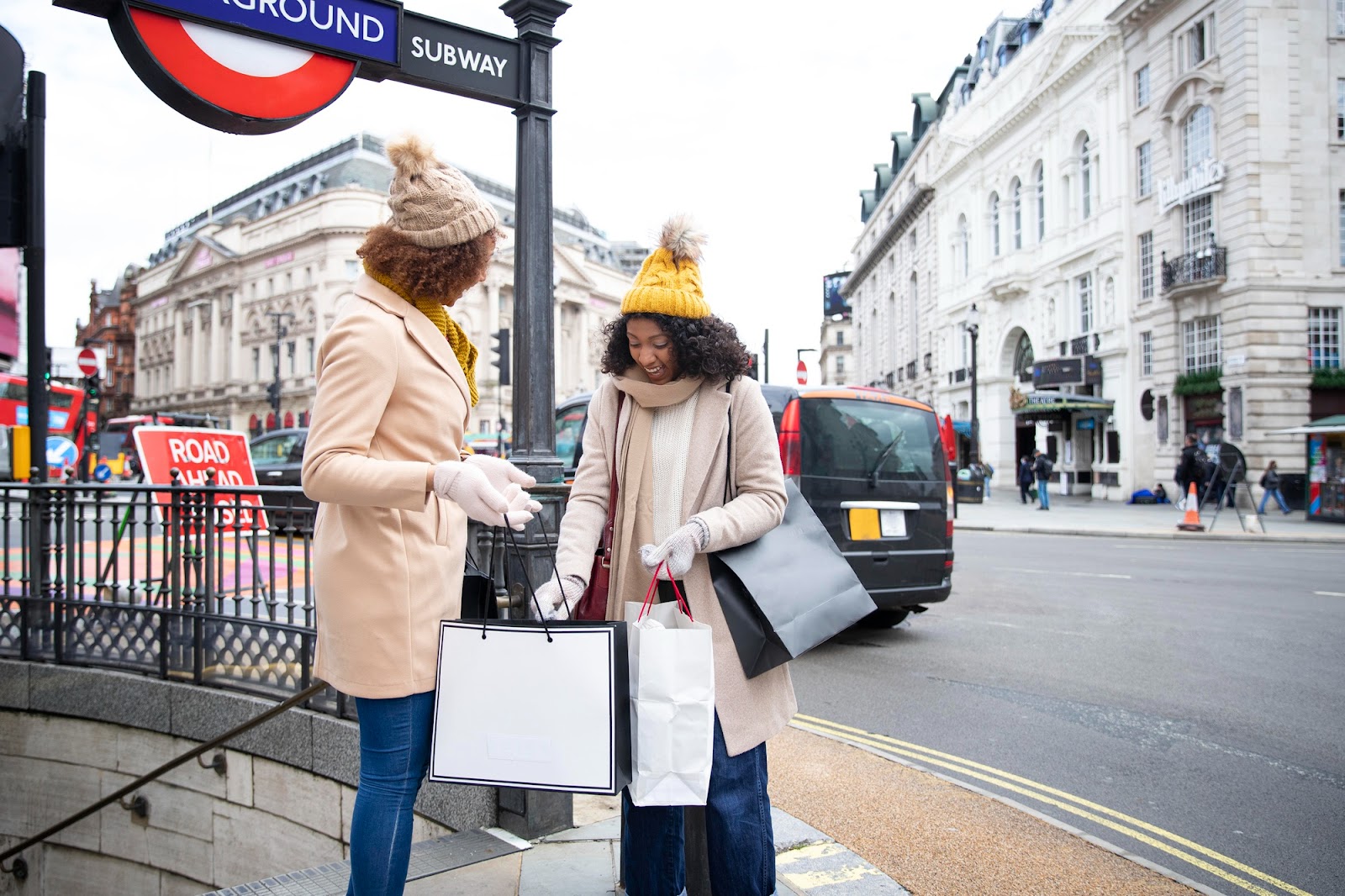The streets are abuzz with vibrant markets. Ever contemplated the intricacies of shopping abroad?
Navigating foreign shopping arenas is an art, blending negotiation, cultural acumen, and an eye for authenticity to secure treasures without the tourist trap markup.
Mastering the orchestration of haggling in souks, unraveling the secrets of a city's boutiques, and savoring the pursuit of that perfect 'find'—transcends the mere acquisition of items. It's about immersing yourself in the local tapestry and bringing home a piece of your travels.

Pre-Trip Planning
Before embarking on your international retail adventure, dive into reconnaissance. Research the local fashion scene to pinpoint districts renowned for textiles, design, and craftsmanship. It’s crucial to understand the lay of the land, particularly if you're seeking quintessential items specific to the region.
Examine currency exchange rates, sales taxes, and possible tourist discounts ahead of time. These fiscal details are often overlooked but can greatly impact your shopping budget. Awareness of potential savings or costs ensures a smoother transaction experience.
Researching Your Destination
Before setting foot abroad, it's essential to investigate the unique shopping landscape your destination offers. A solid understanding of the area's retail rhythm helps prevent cultural faux pas and aligns your shopping itinerary with local customs.
Familiarizing yourself with local festivals or shopping seasons can yield unique opportunities. Many regions have specific times when retailers offer sales, such as January and July in Paris for les soldes, which are regulated sale periods.
Currency Conversion and Payment Methods
Navigating through foreign markets requires understanding the local currency and how conversions affect your purchasing power. Be mindful of exchange rates and transaction fees.
Consider using credit cards that offer no foreign transaction fees for effortless payments.
When exchanging currency, always look for official exchange bureaus or banks to ensure you receive a legitimate rate and avoid potential fraud. Mind the gap between buy and sell rates, as they can significantly impact your budget.
Digital wallets and payment apps are increasingly prevalent and can offer a secure alternative to carrying cash. However, always have some local currency on hand for places where digital transactions may not be accepted.
Understanding Cultural Norms
When embarking on international shopping expeditions, it's fundamental to acquaint oneself with the local customs and etiquette.
In Japan, for example, it's common to be offered a tray to place your payment rather than handing it directly to the cashier. Similarly, haggling may be an integral aspect of commerce in markets such as those in Marrakech, whereas it would be considered quite rude in price-fixed European boutiques.
It's prudent to recognize that gestures and behaviors—so familiar at home—may carry different connotations abroad.
A thumbs-up, for instance, can signify agreement and positivity in the Western context but can be an offensive gesture in parts of the Middle East and Asia.
Accommodation Choices for Shoppers
Look for accommodations near major shopping areas for convenience. Hotels offering concierge services can provide valuable shopping advice and assist with logistics like shipping. Accessibility to public transport is also crucial for easy travel.
And don't forget to match your stay with your budget. For those heading to Dallas for a shopping spree, opting for affordable hotels close to Dallas Market Center can make your trip both enjoyable and efficient, blending convenience with access to a plethora of shopping delights.

Packing Essentials for the Hunt
Conquering the globe, one shopping spree at a time requires preparation.
Here's what to pack for a seamless shopping expedition:
- Luggage: Prioritize a durable, lightweight carry-on with multidirectional wheels for easy maneuvering. Pack foldable tote bags or a compact daypack for smaller purchases.
- Electronics: Include a universal travel adapter to keep your devices powered globally.
- Comfort: Invest in high-quality, supportive shoes (consider orthopedic insoles) and moisture-wicking clothes for long shopping days.
- Security: Use a travel wallet or money belt hidden under clothing to safeguard your valuables.
- Fitting on the Go: Pack a slender tape measure, a portable clothes steamer, and a compact mirror for trying on clothes outside fitting rooms.
- Adaptability: Bring a lightweight, water-resistant jacket and UV protection accessories for both outdoor markets and indoor stores.
Where to Shop - From Locals to Luxury
Embarking on a shopping adventure abroad, discerning globetrotters know that local markets are treasure troves of authenticity. Here, one can haggle for handcrafted goods and immerse themselves in the bustling energy of indigenous commerce.
For those who find their sartorial bliss in the lap of luxury, the world's fashion capitals offer an unrivaled array of high-end retailers. Walking down streets lined with the grandiosity of flagship stores, one experiences the pinnacle of craftsmanship and design.
Discovering Local Markets
Local markets are a kaleidoscope of culture, offering one-of-a-kind finds and the pulse of the community.
Here's how to navigate the vibrant world of local markets:
- Research Before You Go - Look up the most recommended markets and their specialty items to prioritize your visits.
- Know the Market Days - Local markets often operate on specific days of the week; ensure your itinerary aligns with them.
- Carry Local Currency - Many market vendors prefer cash, and having local currency facilitates smoother transactions.
- Learn Basic Phrases - Knowing terms for numbers, greetings, and haggling in the local language can enhance your shopping experience.
- Be Respectful and Patient - Markets can be crowded and chaotic; embrace the pace with a respectful and patient attitude.
- Check Customs Regulations - Before making a purchase, know what you can legally bring back to avoid disappointments at customs.
Boutique Shopping
Boutique shopping offers a unique journey into the essence of local fashion, where each find is not just a piece of clothing but a story of craftsmanship and tradition.
Engaging with boutique owners enriches this experience as they share the inspiration behind their collections. It's an opportunity to immerse yourself in the local style, selecting pieces that reflect the cultural richness and versatility of different occasions.
When shopping, consider the boutique's policies on returns or alterations to ensure your selections fit perfectly into your wardrobe. Boutiques stand out for their exclusivity, often featuring limited edition items and bespoke services.
Department Stores and Shopping Malls
Encompassing a myriad of brands under one roof, department stores, and shopping malls offer convenience and variety.
Here's how to navigate these retail havens:
- Scan for map kiosks to efficiently navigate sprawling floor plans.
- Look out for visitor discounts often available to international shoppers.
- Allocate enough time for browsing through diverse sections; luxury, contemporary, and bargain deals coexist here.
- Familiarize yourself with the tax-refund process in the region to capitalize on potential savings.
- Utilize personal shopping services, if available, for a tailored shopping experience.

Making the Most of Your Shopping Experience
To enrich your global retail adventures, immerse yourself in the locale's retail culture; be it the chic boutiques of Paris, the bustling markets of Istanbul, or Tokyo's cutting-edge technology stores.
Embrace the uniqueness of each shopping environment by engaging with local artisans and vendors—it enhances your shopping experience and cultural understanding. Research local specialties and craftsmanship to ensure authentic finds.
Utilize the ubiquity of digital payment platforms for seamless transactions, and always be abreast of currency exchange rates to gauge your expenditures accurately.
Communicating with Sellers
Whether haggling in a Moroccan souk or discussing prices in a Parisian antique shop, the key to success lies in respectful interaction. Conveying genuine interest in an item and its provenance establishes a connection with the seller.
A simple 'thank you' or 'hello' can go a long way—especially in local dialects. When shopping abroad, expressing basic courtesies in the native tongue can break the ice and engender goodwill.
In areas where language barriers are significant, non-verbal cues are invaluable. Learning to effectively use hand signals, facial expressions, and body language augments the communication spectrum.
With the advent of smartphone translation applications, bridging linguistic divides has never been simpler. Regaling a vendor with a smile and your smartphone translator can alleviate the potential stress of language gaps.
Quality Checks and Authenticity Verification
When venturing into foreign markets, the allure of finding unique items can be strong. Yet, it's pivotal to maintain a discerning eye for quality and authenticity. This holds particularly true for high-ticket items like designer apparel, luxury watches, or local artisan crafts.
Mastering the art of quality assessment requires familiarity – knowing the hallmarks of authenticity. For example, with luxury goods, identifying the stitch consistency, material quality, and hardware can be indicative of authenticity.
When possible, insist on documentation that verifies the origin and authenticity of the item – especially for investment pieces. Legitimate dealers will provide a certificate of authenticity or a guarantee.
Post-Purchase Considerations
After securing your international treasures, the integrity of your items must remain impeccable until you return home. Consider environmental factors, such as humidity and temperature, which could compromise textiles or delicate materials.
Additionally, ensure secure, proper packaging to maintain the condition during transit and prevent potential damage.
Evaluate your home country's customs regulations meticulously to avoid complications upon re-entry. Be aware of duty fees and import restrictions for certain items, as failure to comply can result in penalties or the confiscation of your treasured acquisitions.
Managing VAT Refunds and Customs
To reclaim VAT, follow each country's specified protocol; these may vary and demand attention to detail. Approach refund points well before departure to avoid last-minute hassles.
As you indulge in shopping, remain cognizant of your entitlement to seek a VAT refund – restrictions often apply (based on residency or purchase thresholds) and warrant consideration.
Keep the unworn/unopened status of items, especially if you're aiming for a tax rebate – tags, receipts, and original packaging should be retained intact. This enhances your compliance with refund conditions.
Shipping Items Home
Shipping your treasures home can be a savvy move to free up luggage space. When embarking on your shopping adventures abroad, you might accumulate more items than your suitcase can handle.
The logistics might seem daunting, but reputable international shipping companies offer reliable services. Always compare prices and delivery times of different carriers. Some might propose advantageous flat-rate options depending on the weight or volume of your package.
Consider the value of your goods when deciding on the appropriate insurance coverage for your shipment. Insurance acts as your financial safety net should any of your items be damaged or lost during transit.
Customs regulations can be quite intricate, varying greatly from one country to another. It's prudent to inform yourself about potential duties, taxes, and prohibited items to avoid complications. Presenting a detailed list of the contents and their values helps to expedite the customs process and prevents misunderstandings. Visit Campstar.com to know more.
Conclusion
Crafting a memorable shopping experience overseas involves balancing enthusiasm with prudence, acquiring goods, stories, and connections. It's blending the joys of discovery with the satisfaction of wise choices.
Your ultimate takeaway should extend beyond souvenirs—it's a tapestry of cultural immersion, savvy negotiations, well-chosen treasures, and tales to share. Approach each expedition as an opportunity to enrich your life's mosaic, adhering to the insight shared here to weave a fulfilling narrative of your travels. When done right, shopping abroad isn't just an activity; it's an enriching chapter in the traveler's odyssey.
Post Comment
Be the first to post comment!

